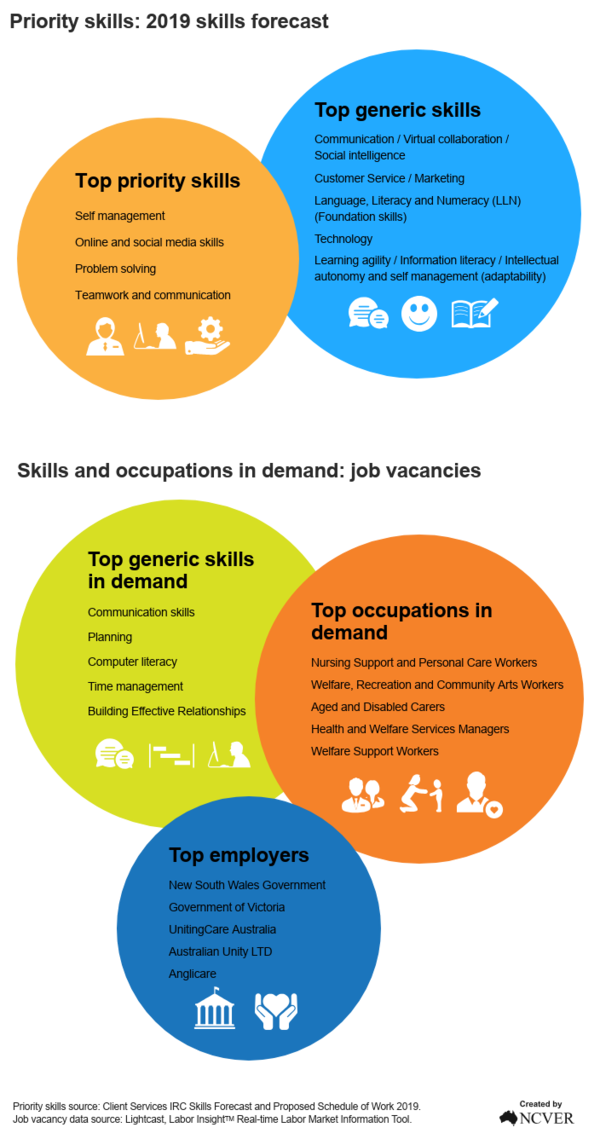
Industry insights on skills needs
The Client Services IRC's 2019 Skills Forecast identified the top priority skills for the sector as self management, online and social media skills, problem solving, and teamwork and communication. The top five identified generic skills are:
- Communication / Virtual collaboration / Social intelligence
- Customer Service / Marketing
- Language, Literacy and Numeracy (LLN) (Foundation skills)
- Technology
- Learning agility / Information literacy / Intellectual autonomy and self management (adaptability).
According to the job vacancy data, the top requested skills by employers in the sector were communication skills and planning. The most advertised occupations were Nursing Support and Personal Care Workers followed by Welfare, Recreation and Community Arts Workers. The top employers were the New South Wales Government and the Government of Victoria.
According to the Client Services IRC's 2019 Skills Forecast, the sector is facing several challenges and changes that impact workforce skills requirements. These include:
- Government policy/legislation changes – a major restructuring of the mainstream employment services program, jobactive; the Women's Economic Security Package (WESP); and a review of the family law system
- New technologies – online and social media; online video counselling (OVC); and the Online Dispute Resolution System (ODRS) for use in family law matters
- Low language, literacy and numeracy skills
- Staff wellbeing and retention.
The above Skills Forecast highlights the importance of VET for celebrants in the sector. It states that improving the depth and breadth of initial and continued training to equip independent celebrants with the skills to provide quality services in a professional manner to their communities should increase the general public's confidence in, and respect for, independent celebrants and increase the opportunity for them to take on additional work. The VET system plays an important role in providing nationally accredited courses for new and existing celebrants in the sector.
The Client Services IRC's 2019 Skills Forecast also highlights that due to the mass-adoption of online and social media by the general public, it is important for the Client Services sector to establish and maintain a high profile on social media and there is therefore a need for students to develop online and social media skills to aid in their work-readiness. For example, Commonwealth-registered marriage celebrants are required to complete five hours of ongoing professional development (OPD) activities each calendar year, which can include online and social media activities such as:
- Social media marketing
- Knowing how to create appropriate social media content
- Creating and maintaining a social media presence
- Social media as a marketing tool
- Networking using social media.
Recent studies indicate that the advent of online video counselling (OVC) has the potential to improve service delivery options in counselling and Family Dispute Resolution (FDR). OVC can work as effectively as face-to-face resolution for family disputes, particularly in cases where parties are situated in different locations, and can be utilised in instances where clients in rural, regional or remote areas do not have access to face-to-face counselling services, or in instances where clients require time flexibility. Due to the growing interest of online video applications in counselling and FDR, it is important for staff in these industries to be proactively aware of, and open to, related technologies and training.
The Client Services IRC's 2019 Skills Forecast outlines several reasons why it is necessary to ensure staff in the sector possess a strong foundation in language, literacy and numeracy (LLN) skills, namely:
- To allow for the development of technical skills
- To adequately support their customer base if they are in front-line job roles
- To ensure that in certain sub-sectors they can write accurate case notes and other client-related documents in order to minimise potential negative ramifications if these documents are not accurately written, e.g. poor client care.
At the federal level, there is a driving force for services funded by government to move towards outcomes measurement frameworks. As such, there is also an emerging need for practitioners working across a broad range of services to be able to understand data capture, to have solid data-entry skills, and to be able to read and understand data reports.
Within all the Client Services sub-sectors, the wellbeing of workers is a necessary workplace health and safety priority and a factor influencing the retention of staff. Overall, workers in the Client Services sector (e.g. child protection workers, case managers, financial counsellors, family dispute resolution practitioners, etc.) are regularly required to manage large numbers of complex cases, which can cause stress, emotional fatigue and potentially vicarious trauma. To ensure the wellbeing of workers in the sector, it is necessary to develop and implement wellbeing programs for staff. At the individual level, students and staff can be encouraged to be aware of emotional fatigue and burn-out, and develop and practise self-care skills.
Commonwealth-registered marriage celebrants must complete five hours of ongoing professional development (OPD) every calendar year. The Marriage Celebrants Program is managed by the Attorney-General's Department (AGD) on behalf of the Australian Government. The Ongoing Professional Development for Marriage Celebrants: Discussion Paper is part of the AGD’s periodic review of the program to ensure it is cost effective and efficient. The program has the legitimate aims of applying appropriate scrutiny to aspiring marriage celebrants; supporting the availability of marriage services across Australia; and regulating marriage celebrants' performance to ensure professional, knowledgeable and legally correct marriage services for marrying couples. The purpose of the discussion paper is to seek the views of marriage celebrants, their representatives, training providers and other interested stakeholders about OPD for marriage celebrants into the future. OPD is intended to promote professionalism for marriage celebrants and this should be balanced with the need to ensure reasonable compliance costs for marriage celebrants and be efficient to administer.
The Ongoing Professional Development for Marriage Celebrants: Survey Results were released in October 2021. There were approximately 2,080 responses to the survey, of which, around 2,070 respondents were Commonwealth-registered marriage celebrants. The majority of respondents (67%) were in favour of the proposed option that OPD consist of an annual compulsory activity of one or two hours, only, available free of charge through the celebrant self-service portal and other means such as email. The results of the OPD survey will inform AGD's advice to Government on an approach to future OPD regulation that appropriately supports marriage celebrants to maintain current knowledge and skills, while also being efficient for AGD to administer.
The article Reflective Practice in the Art and Science of Counselling: A Scoping Review, highlights that the quest for self-awareness and self-understanding is key to counselling and effective reflective practice. Awareness of one's own skills, knowledge, and performance in the counselling profession are essential for client and counsellor wellbeing. The benefits of effective reflective practice include: evaluating own performance, developing self-awareness, monitoring potential for burnout and ensuring adequate self-care. Ongoing and regular supervision helps maintain a professional level of awareness and professional development.
According to the Financial Counselling Scope of Practice, Financial Counsellors should demonstrate specific skills and technical knowledge. This includes, but is not limited to full understanding and application of the following:
- Counselling, interview and assessment skills
- Advocacy skills – individual and systemic
- Ability to present complex information to the client
- Ability to identify complex problems
- Application of emotional intelligence and well-developed interpersonal skills
- Negotiation skills
- Active listening and supportive questioning
- Community development skills
- Research and information gathering skills
- Problem-solving skills
- Best practice administration skills and record keeping
- Excellence in telephone, email and letter writing skills
- Computer literacy, including use of common software programs including word processors, spreadsheets, and email programs, for example, Microsoft Office programs such as Word, Excel and Outlook
- Proficiency in data entry, case note and report writing
- Time management skills.
A Financial Counsellor can develop additional skills to provide professional supervision to other Financial Counsellors. This requires undertaking education to become a professional supervisor. State associations ensure that Financial Counsellors have appropriately trained professional supervisors through annual demonstration of currency in professional supervision.
The Australian Federal Government will slash $1.1 billion in costs by telling some job seekers to hunt for work online rather than meeting with employment advisers in person, as part of a new 'digitally driven' strategy, according to the Australian Financial Review article Job Hunters Pushed Online, Slashing $1.1b From Centrelink Costs. The government will cut social services costs by creating what it terms the 'New Employment Services Model' and streaming job seekers. The government expects to save $860 million over four years by moving to the new model from July 2022, claiming it will be more efficient if some job seekers choose digital support services rather than face-to-face services, arguing that not everyone needs the support of in-person assistance because they find new jobs quickly.
The article Towards Digital Dole Parole: A Review of Digital Self-Service Initiatives in Australian Employment Services, draws on program implementation documentation to describe recent digital self-service initiatives known as the Targeted Compliance Framework and the Online/New Employment Services Trials. The term 'digital dole parole' is used to signify the transfer of employment services supervision onto the new digital dashboard through which job seekers have become responsible for reporting attendances at activities and job search and to monitor their own 'compliance'. These initiatives are the technologies that will underpin the shift to digital employment services in the New Employment Service model. This shift will radically change the employment services quasi-market, and the street-level delivery of labour market programmes.
Blueprint: Regional and Community Job Deals responds to the impacts of COVID-19 and entrenched unemployment. It complements reforms the Federal Government has started of the national employment services system, and builds on the Local Jobs Program and the establishment of Local Jobs and Skills Taskforces in 25 employment regions, announced in September 2020. It offers a detailed how-to guide to scale up regionally and locally tailored approaches to tackling unemployment, with a focus on people facing disadvantage in the job market. It aims to make locally and regionally differentiated responses an enduring part of the employment service system.
The article A New Paradigm: Bringing a Historical and Sociopolitical Trauma Lens to the Training for Welfare Practitioners Working with Aboriginal Families, argues that child protection agencies must provide mandatory training about the Aboriginal experience within the welfare state and the resultant trauma that exists in Australian Indigenous communities. The article highlights the areas of curriculum to be included in training for welfare practitioners working with Aboriginal families in the New South Wales child protection system. The training content explores the Stolen Generations' trauma experiences of child loss and examines the dichotomy between past child welfare laws and present child protection laws and intergenerational racism. Another key component of the training comprises information about the impacts of trauma on brain development.
The Efficacy of a Child Protection Training Program on the Historical Welfare Context and Aboriginal Trauma reports on the findings from a study exploring the efficacy of a training program for child protection practitioners. The training aimed to improve understanding of the sociohistorical context that underpins interactions between the welfare system and Aboriginal communities, the impact of past and present child protection laws, and the importance of trauma theory to guide practice when working with Aboriginal families.
The study found the lack of skills and knowledge deficit of trauma-informed principles and the limited understanding of trauma theories can be and should be addressed in vocational training. As a result of the training, participants' knowledge about trauma significantly improved, as did their understanding of key concepts such as the difference between past and current welfare laws, assimilation, intergenerational trauma and trauma-related behaviours. Findings point to the need for high quality training in entry-level and professional development for welfare practitioners to support best practice in working with Aboriginal families, and the importance of rigorous evaluation of training to ensure that it is impactful. Three important implications are identified:
- Welfare practitioners do not necessarily understand trauma theory and trauma-informed practice and do not understand the impact of trauma on Indigenous Australians.
- Mandatory in-service training about the past and ongoing traumatic impact of previous child welfare system laws, must be provided to welfare practitioners.
- Trauma theory needs to guide child protection practice when working with Aboriginal families.
In the article Barriers and Solutions: Australian Indigenous Practitioners on Addressing Disproportionate Representation of Indigenous Australian Children Known to Statutory Child Protection, the author outlines the views of Indigenous practitioners collected as part of her doctoral study exploring the experiences of Aboriginal and Torres Strait Islander practitioners who undertake child protection work in Australia. The narratives of practitioners identify barriers in contemporary statutory child protection practices that may contribute to the disproportionate representation of Indigenous children in the statutory child protection system. Potential solutions offered by practitioners including cultural supervision for non-Indigenous practitioners are also outlined. The narratives of participants indicate that Indigenous practitioner-led policy, practice, training and programme design is critical to addressing the escalating rates of Indigenous child removal in Australia.
The Framework to Inform the Development of a National Aboriginal and Torres Strait Islander Early Childhood Strategy has been created to inform renewed and dedicated efforts to ensure Aboriginal and Torres Strait Islander children have the best start in life, wherever children live in Australia. One of the key focus areas is child protection.
Family Matters aims to eliminate the over-representation of Aboriginal and Torres Strait Islander children in out-of-home care within a generation, by 2040. The Family Matters Report 2020 highlights Aboriginal and Torres Strait Islander-led solutions and calls on governments to support and invest in the strengths of Aboriginal and Torres Strait Islander peoples to lead on child wellbeing, development and safety responses for their children. The report contributes to efforts to change the story by explaining the extent of the challenges, reporting on progress towards implementing evidence-informed solutions, and profiling promising policy and practice initiatives.
The recruitment of Aboriginal and Torres Strait Islander practitioners into child protection systems to work with Indigenous families at risk underpins the government strategy to reduce the over-representation of Aboriginal and Torres Strait Islander children in all parts of the child protection system in Australia. However, little is known about the experiences of Indigenous people who undertake child protection work or what their support and supervision needs may be. The article Working for the Welfare: Support and Supervision Needs of Indigenous Australian Child Protection Practitioners, centres on Indigenous Australian child protection practitioners as experts in their own experiences. Many in the child protection field view their work as an extension of their Indigeneity. This coupled with the historical experience of state-sanctioned removal of Indigenous children during colonisation and contemporarily, informs the need for child protection workplaces to re-think the support and supervision afforded to Indigenous practitioners.
The media release Transforming the System for Our Most Vulnerable Kids, highlights what the Victorian Government is doing to provide more support than ever before for at-risk children, their families and their carers, as part of a massive $1.2 billion boost for the children and families system in Victoria. Not only will this support young Victorians and their families, it will also support more than 1,045 Victorians with a good, secure job. The 2021-22 Budget delivers $171 million to further increase the number of child protection workers on the frontline, with 280 new practitioners to be recruited, including 34 child protection navigators to connect children and families to the intensive family support they need. In the 2020-21 Budget, 239 new positions were created, bringing the total to more than 1,180 permanent new positions since 2014. A new trial, Frontline Victoria, will also create a new fast-tracked path for degree-qualified career changers to move into a role within the child and families services system thereby strengthening the workforce and strengthening support for Victoria's children.
The YWCA Canberra Submission to the Joint Select Committee on Australia's Family Law System argues that child protection services need better training on family violence and cultural competency to prevent them from reinforcing the unjust barriers, marginalisation and control exercised against those who experience violence in cultural settings particularly Aboriginal and Torres Strait Islander women and their children.
The report of the Inquiry into Family, Domestic and Sexual Violence included 88 recommendations. Two of particular relevance to this sector are:
- Recommendation 26: The Committee recommends that the Australian Government, and state and territory governments, develop and provide funding for training for the identification of coercive and controlling behaviour for police; justice and legal sector practitioners; and health, mental health, social services, and specialist family, domestic and sexual violence service workers. The Committee further recommends that the Australian Government and state and territory governments consider developing minimum standards for training on coercive control and including training on coercive control in relevant professional qualifications.
- Recommendation 79: The Committee recommends that the Australian Government and state and territory governments provide funding on a 50-50 basis to legal aid commissions and community legal centres to engage more social workers experienced in family violence, child protection and family law matters. The Committee would hope to see improvements made to the family law system to better support families experiencing family domestic and sexual violence. These improvements should include improved information sharing, mandatory training for family law professionals and holistic service supports for families as they move through the family law system.


